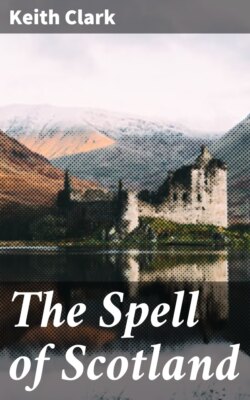Читать книгу The Spell of Scotland - Keith Clark - Страница 13
На сайте Литреса книга снята с продажи.
Jedburgh
ОглавлениеFrom Kelso I took train to the Border town which even the Baedeker admits has had "a stormy past," and where the past still lingers; nay, not lingers, but is; there is no present in Jedburgh. It is but ten miles to the Border; more I think that at any other point in all the blue line of the Cheviot, is one conscious of the Border; consciousness of antiquity and of geography hangs over Jedburgh.
It lies, a hill town, on the banks of the Jed; "sylvan Jed" said Thomson, "crystal Jed" said Burns; a smaller stream than the Tweed, more tortuous, swifter, rushing through wilder scenery, tumultuous, vocative, before Border times began—if ever there were such a time before—and disputatious still to remind us that this is still a division in the kingdom.
One of the most charming walks in all Scotland—and I do not know of any country where foot-traveler's interest is so continuous (I wrote this before I had read the disastrous walking trip of the Pennell's)—is up this valley of the Jed a half dozen miles, where remnants of old forest, or its descendants, still stand, where the bracken is thick enough to conceal an army crouching in ambush, where the hills move swiftly up from the river, and break sharply into precipices, with crumbling peel towers, watch towers, to guard the heights, and where outcropping red scars against the hill mark sometimes the entrance to caves that must have often been a refuge when Border warfare tramped down the valley.
In Jedburgh we lodged not at the inn; although the name of Spread Eagle much attracted us; but because every one who had come before us had sought lodging, we, too, would "lodge," if it be but for a night.
Mary Queen had stayed at an old house, still standing in Queenstreet, Prince Charles at a house in Castlegate, Burns in the Canongate, the Wordsworths, William and Dorothy, in Abbey Close, because there was no room in the inn. I do not know if it were the Spread Eagle then, but the assizes were being held, Jethart justice was being administered, or, juster justice, since these were more parlous times, and parley went before sentence. Scott as a sheriff and the other officials of the country were filling the hostelry. But Sir Walter, then the Sheriff of Selkirk, sheriff being a position of more "legality" than with us, and no doubt remembering his first law case which he had pled at Jedburgh years before, came over to Abbey Close after dinner, and according to Dorothy Wordsworth "sate with us an hour or two, and repeated a part of the 'Lay of the Last Minstrel.'"
Think of not knowing whether it was an hour or two hours, with Scott repeating the "Lay," and in Jedburgh.
We lodged in a little narrow lane, near the Queen in the Backgate, with a small quaint garden plot behind; there would be pears in season, and many of them, ripening against these stone walls. The pears of the Border are famous. Our landlady was removed from Yetholm only a generation. Yetholm is the gipsy capital of this countryside. And we wondered whether Meg Faa, for so she ambitiously called herself, by the royal name of Scottish Romany, was descended from Meg Merrilies. Mrs. Faa had dark flashing eyes in a thin dark face, and they flashed like a two-edged dagger. She was a small woman, scarce taller than a Jethart ax as we had seen them in the museum at Kelso. I should never have dared to ask her about anything, not even the time of day, and, in truth, like many of the Scotch women, she had a gift of impressive silence. All the night I had a self-conscious feeling that something was going to happen in this town of Jed, and in the morning when I met Mrs. Faa again and her eyes rather than her voice challenged me as to how I had slept, I should not have dared admit that I slept with one eye open lest I become one more of the permanent ghosts of Jed.
